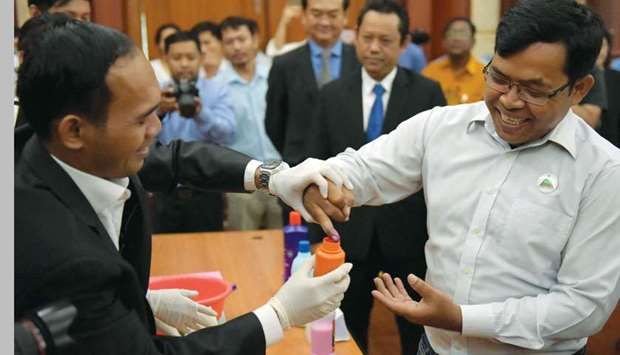Strongman leader Hun Sen is set to extend his 33-year grip on power in the upcoming election after supporting the dissolution of the main opposition group last year and turning up the heat on civil society and the media.
In recent weeks, however, opposition figures – mostly those who left the country in the wake of the sweeping crackdown – have pushed back and called on voters to skip the poll in protest.
“In a democratic country, the election is very important, so the campaign against the election or to disrupt people from going to vote is a crime,” Tep Nytha, secretary general of the National Election Commission, told reporters.
He said authorities would take legal action against anyone involved in the boycott and some people who called in to “curse” election officials and use “bad words” against them were being targeted, but did not elaborate.
The government has previously warned of prosecuting boycott campaigners and Tep Nytha doubled down on the threat while unveiling tens of thousands of ink bottles
yesterday.
Supporters of a boycott have posted photos on social media holding up a “clean finger” – a symbol of protest to urge Cambodians not to dip their fingers in the ink used in the process.
The daughter of Kem Sokha, a leader of the opposition Cambodia National Rescue Party who was arrested in the crackdown and remains behind bars on charges of treason, showed support for the boycott on Tuesday on Twitter.
“No CNRP, no real election! No voting, no dirty finger!” she said.
Sam Rainsy, a senior opposition figure who helped found the CNRP and lives in self-exile in France, said that the boycott was a form of political
disobedience.
“The CNRP is explaining to the population that voting is not legally binding in Cambodia and that exercising one’s right not to vote on July 29 is a way of saying ‘no’ to Hun Sen and his
totalitarian drift,” he said.
The upcoming vote will be the most one-sided in recent memory following the dissolution of the main opposition party, which made significant gains in national elections in 2013 and in local polls four years later.
But a poor turnout on voting day could also send a message.
Andrea Giorgetta, director of the Asia desk for the International Federation for Human Rights, said the proposed boycott was perfectly legal and that government’s reaction to it was “another sign of their fear”.
Western democracies withdrew funding for the vote but Cambodia’s biggest backer China has maintained its support.

